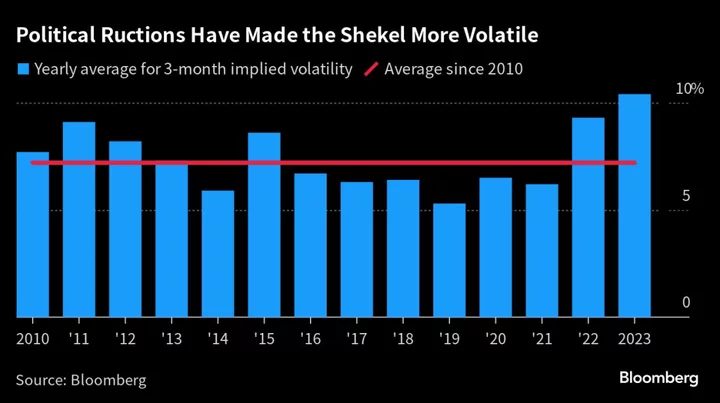Israel’s central bank kept interest rates unchanged on Monday, breaking with the US Federal Reserve’s last decision to tighten policy even after the shekel depreciated almost to a three-year low.
The monetary committee left its benchmark at 4.75% for a second consecutive meeting, in line with the forecasts of almost all economists surveyed by Bloomberg. The shekel maintained losses after the announcement and traded 0.4% weaker against the dollar at 5:37 p.m. in Tel Aviv.
The central bank repeated its guidance that it “sees a real possibility of having to raise the interest rate in future decisions, if the inflation environment does not continue to moderate as expected.”
In extending the pause, Israeli monetary authorities are opting to deviate from the direction taken by the Fed for the first time since embarking on an aggressive campaign early last year to tame inflation. The rate differential with the US widened in July when the Fed hiked, making the Israeli currency and bonds less attractive to investors at a time when those assets are already under pressure from political unrest.
Israel’s central bank raised rates 10 straight times after starting in February 2022 near zero. The tightening is finally paying off, with inflation slowing by nearly a full percentage point in July to an annual 3.3%.
Though a pickup is likely in the months ahead, price growth in seasonally adjusted terms is already within the government’s 1%-3% target range, according to Psagot Investment House.
But government efforts to weaken the judiciary and the mass protests they’ve triggered have unsettled markets, feeding the weakness in the Israeli currency that risks faster inflation by making imports more expensive.
A rate hike to 5% remains a possibility should the shekel continue to weaken and shift inflation estimates higher, according to Gil Bufman, Bank Leumi’s chief economist.
Excluding a short-lived depreciation at the start of the Covid-19 pandemic, the shekel is now near a six-year low. It’s down 6% against the dollar since mid-July, one of the worst performances in a basket of expanded major currencies tracked by Bloomberg. Those recent losses have taken its drop in 2023 to almost 8% and increased its volatility to the highest in more than a decade.
“The shekel’s depreciation in recent months is contributing to the increase in the inflation rate and the path of the exchange rate in the coming months will have an impact on the dynamics of inflation,” the monetary committee said in its statement.
The Bank of Israel has made clear hikes aren’t yet off the table, with Governor Amir Yaron saying in July that rates might continue going higher “if we see evidence that the inflation environment is not moderating at a suitable pace.”
Yaron, who’s approaching the end of his five-year stint, has criticized the judicial overhaul and has said he’ll announce his plans for the future around September. On Monday, the central bank denied a report in local media that the governor was preparing to make an announcement after the rate decision about whether or not he’d seek a new term.
In an interview in August, Prime Minister Benjamin Netanyahu said he had yet to decide if he’ll ask Yaron to stay on.
Inflation, Employment
Tighter monetary policy will increasingly act as a drag on the economy, according to Bank Hapoalim. But even with a moderation in growth, the labor market is taut enough to force companies to bid up wages with unemployment just short of an all-time low at 3.4%.
Political uncertainty at home and the possibility US rates will rise again are also certain to make for a challenging outlook for the shekel.
While Fed officials have signaled they may be close to wrapping up, Chair Jerome Powell said last month that inflation remained too high and central bankers were prepared to do more. The next Fed meeting is on Sept. 20, though few analysts expect a raise that soon.
“As long as the shekel remains under depreciation pressures, we think that the hawkish bias is likely to stay,” Goldman Sachs Group Inc. economists Tadas Gedminas and Kevin Daly said in a report. “The currency remains vulnerable to domestic political developments.”
--With assistance from Harumi Ichikura and Alisa Odenheimer.

